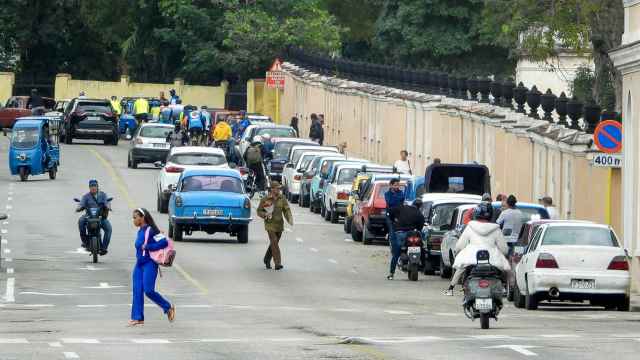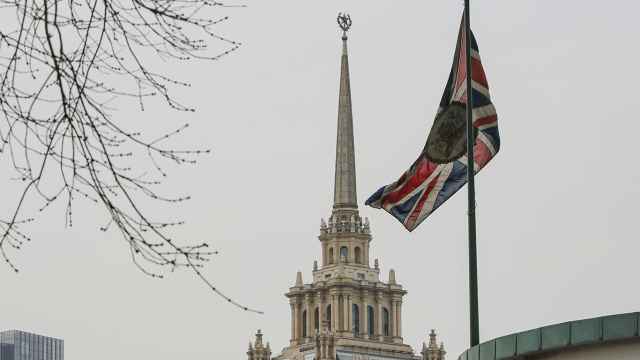President Dmitry Medvedev and other BRICS leaders called for sweeping reforms of international financial mechanisms, hinted at displacing the U.S. dollar as the world's major trade currency and coordinated their political stand at a summit of leading merging economies in China on Thursday, but there were few actions to match the words.
Speaking at the summit of Brazil, Russia, India, China and South Africa in Sanya, China, Medvedev said he and his Chinese counterpart Hu Jintao had "agreed to intensify work on the eastern and western gas supply routes before the end of the year" during a bilateral meeting earlier in the day.
"We are talking about this year, I mean the basic conditions for approval. Naturally, the deliveries will begin later," he told reporters, adding that, although each side would push its own business interests in price negotiations, positions had generally moved closer.
China is a growing foreign policy priority for Russia. It is the world's biggest energy consumer and became Russia's main trading partner last year.
Medvedev promised during a visit to Beijing in September to supply China with all the gas it needs for economic development.
In 2009, China extended a $25 billion preferential-rate loan to Rosneft and Transneft in exchange for a 20-year oil supply contract.
Medvedev will go on an extended visit to China, following the BRICS meeting, with an appearance at China's Boao Forum and a visit to Hong Kong on Saturday.
Although the BRICS forum had criticized the world's reliance on the U.S. dollar, Medvedev played down speculation that the five countries might adopt the Chinese yuan as a trade currency.
"Of course, the Chinese economy is huge, and in this sense the role of the yuan is growing, but we haven't made any special decisions regarding the yuan, nor are they being discussed," he told reporters.
Earlier Thursday, the five countries signed a memorandum on cooperation among their national financial development institutions that paves the way for the countries to grant one another loans in their national currencies.
Vladimir Dmitriyev, head of Vneshekonombank, told Interfax that the document marked "the first practical step toward using national currencies in economic cooperation between these countries."
China Development Bank was the first institution to take advantage of the new measures, saying it was ready to extend 10 billion yuan in loans to Brazil, Russia, India and South Africa.
The loans are expected to focus on large oil and natural gas projects. China Development Bank chief Chen Yuan cited deepening cooperation with Brazil's Petro Bas when asked for specifics, Reuters reported.
No specific deals relating to Russian companies have emerged so far.
Medvedev also held bilateral meetings with Hu, Brazilian President Dilma Rousseff, Indian Prime Minister Manmohan Singh and South African President Jacob Zuma during the meeting.
Thursday's was the first summit since South Africa joined the club of emerging economies, prompting Medvedev to make a flat joke.
"I don't know who came up with the BRIC abbreviation … but we've come up with a different acronym, and it has already become quite popular."
"After the accession of South Africa, the Russian abbreviation BRYuKI emerged," Medvedev told reporters in Sanya, China. Bryuki means "pants" in Russian.
It may have been a weak joke, but he was right to say the group has changed.
BRIC — Brazil, Russia, India and China — was born as an acronym thought up by Goldman Sachs economist Jim O'Neill as shorthand for the world's leading emerging markets.
But it has become a club for countries — including now South Africa — with a common interest in turning their growing economic strength into political clout on the world stage.
All five are currently members of the UN Security Council.
In this spirit, the five issued a joint statement calling for an overhaul of the international financial system and reform of the International Monetary Fund, criticizing dependence on traditional reserve currencies like the U.S. dollar and condemning NATO-led air strikes against Libya.
"This is not a format where countries decide things; it is much more about showing the emergence of new structures as opposed to old organizations," said Fyodor Lukyanov, editor-in-chief of Russia in Global Affairs.
Nonetheless, there are differences in the group.
In the March 17 Security Council vote authorizing military action in Libya, Brazil, Russia, India and China abstained. South Africa voted in favor, along with other African Union countries.
A Message from The Moscow Times:
Dear readers,
We are facing unprecedented challenges. Russia's Prosecutor General's Office has designated The Moscow Times as an "undesirable" organization, criminalizing our work and putting our staff at risk of prosecution. This follows our earlier unjust labeling as a "foreign agent."
These actions are direct attempts to silence independent journalism in Russia. The authorities claim our work "discredits the decisions of the Russian leadership." We see things differently: we strive to provide accurate, unbiased reporting on Russia.
We, the journalists of The Moscow Times, refuse to be silenced. But to continue our work, we need your help.
Your support, no matter how small, makes a world of difference. If you can, please support us monthly starting from just $2. It's quick to set up, and every contribution makes a significant impact.
By supporting The Moscow Times, you're defending open, independent journalism in the face of repression. Thank you for standing with us.
Remind me later.






